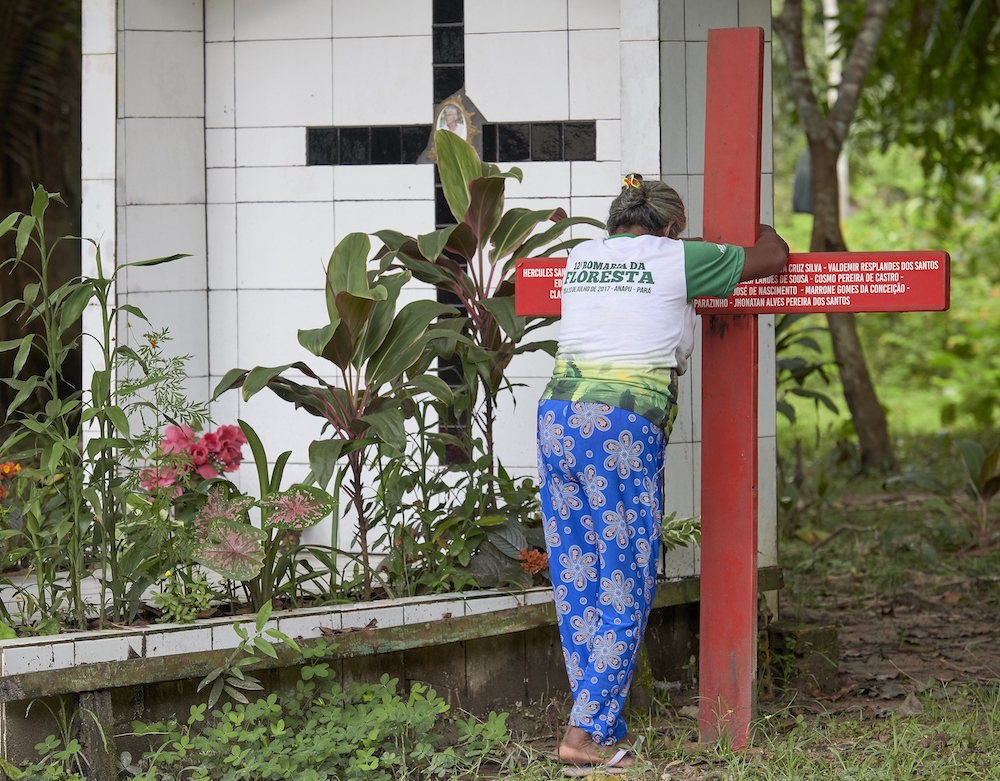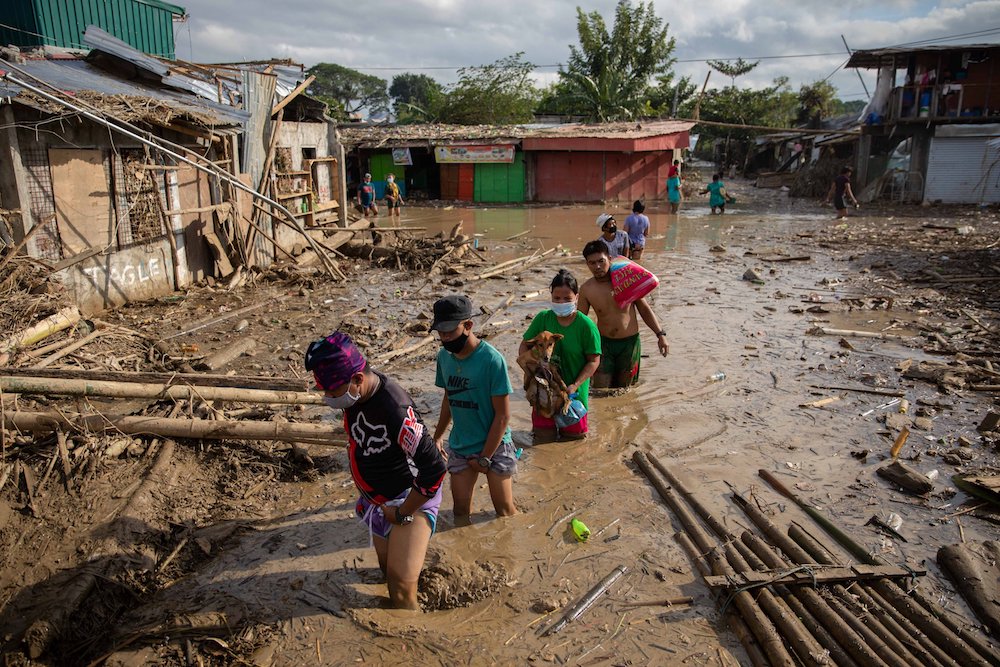
Antonia Silva Lima prays at the grave of U.S.-born Sister Dorothy Stang in Brazil. The red cross bears the names of local rights activists murdered since her killing. (CNS Photo/Paul Jeffrey)
Editor's Note: EarthBeat Weekly is your weekly newsletter about faith and climate change. Below is the Feb. 5 edition. To receive EarthBeat Weekly in your inbox, sign up here.
In much of the world, defending the environment is a matter of life or death.
Indigenous people, traditional communities, small farmers, fisherfolk and others depend on healthy ecosystems for their own health and their livelihoods. But they risk their lives when they defend their land against incursions by mining or oil companies, land speculators, loggers, illegal miners or organized crime groups growing drug crops.
When I talked with Jesuit Fr. Pedro Walpole for this week's story about The River Above Asia and Oceania Ecclesial Network, a new church network linking people of faith throughout the vast Pacific biome, he spoke of the vulnerability of local communities — not just to the sometimes ferocious natural phenomena of the region, but also to abuse by governments and corporations.
"The monsoons and typhoons, they are life and they are death. That's the nature of water," Walpole told me, speaking from his open-sided, wood-frame house on Mindanao, in the Philippines.
"We suffer much, but we must rise with hope and with care for creation," he said. "We need a generation that cares, and it comes out of living with the land, of living with the ocean. People in the Pacific are so close to that environment. They can't get away from it. They are so vulnerable."
Natural phenomena are not the only danger, however. People are also vulnerable to abuse by corporations that buy off government officials and community leaders, use a "divide-and-conquer" strategy to turn community members against each other, and threaten those who resist.
"In some countries … if you don't like someone, or you don't like a community or you don't like an indigenous group, you say they're communist. You can eliminate them," the Jesuit priest said. "Human rights are really under challenge."
That came home to Walpole when the Paris Agreement on climate change was being negotiated. The only reference to human rights is in the preamble, and even then there was an effort to remove it. Catholic groups at the COP 21 United Nations climate summit joined in advocating for the inclusion of human rights in the framework.
"That's when I really realized this is a global dynamic," Walpole said of the practices that leave people unprotected when they stand up for their environmental and land rights.

Residents wade through mud in Manila, Philippines, after Typhoon Vamco in 2020. (CNS photo/Eloisa Lopez, Reuters)
The statistics are chilling. The non-profit watchdog group Global Witness documents the murders of people around the world who are killed for defending their territories or protecting the environment where they live. Some of the victims are well known, like Sr. Dorothy Stang, who was murdered in Brazil in 2005, and Lenca Indigenous leader Bertha Cáceres, assassinated in Honduras in 2016 for her opposition to the construction of a dam in her people's territory.
In 2019, Global Witness tallied 212 murders, although the real number is probably higher. Nearly half the murders — 64 — occurred in Colombia. Philippines was the second-deadliest country, with 43 deaths. Honduras saw 14 murders, the highest per-capita figure.
Nearly two-thirds of all the murders occurred in Latin America, which has been the most dangerous region for defenders of the environment since Global Witness began keeping track in 2012. Most of the killings in Brazil took place in the Amazon region.
Of the global total, 50 people were killed for opposing mining projects. Industrial agriculture ranked second, with 34 victims — most of them in Asia.
There is one bright spot on the horizon. On Earth Day this year — April 22 — an accord aimed at protecting the rights and lives of defenders of the environment will take effect in Latin America and the Caribbean.
The Regional Agreement on Access to Information, Public Participation and Justice in Environmental Matters in Latin America and the Caribbean requires countries to "guarantee the right of every person to live in a healthy environment and to sustainable development" and protect related human rights.
It also upholds "the right to access to environmental information, public participation in the environmental decision-making process and access to justice in environmental matters."
"We suffer much, but we must rise with hope and with care for creation. We need a generation that cares, and it comes out of living with the land, of living with the ocean"
— Jesuit Fr. Pedro Walpole
Those rights are significant. Even where national legislation requires the "free, prior and informed consent" of communities before projects like mining, oil drilling or dam construction can begin on their lands, the so-called consultations are often superficial or merely informative.
Communities often lack the expertise to analyze the potential impacts of projects, and technical and legal advice can be expensive or difficult to find.
Known as the Escazú Agreement, for the Costa Rican town where it was adopted, the pact was signed by 24 nations in March 2018, after about six years of negotiations. Only half have ratified it, however. That's enough for it to enter into force, but not enough to ensure real protection for communities.
Brazil, Colombia and Guatemala — three of the six deadliest countries on Global Witness' 2019 list — signed the accord but have not ratified it. Honduras has neither signed nor ratified. There is still much work to be done to ensure that the agreement is not just another paper promise.
Walpole sees church networks like the ones that have formed in Asia and Oceania, the Amazon, Africa's Congo Basin and Mesoamerica as providing crucial support for communities that are under threat.
"Ecclesial networks affirm the basic rights of people. That's a very important role," he said, adding that they face the challenge of telling the communities' stories "without making people vulnerable."
"That's where it's difficult," he added, "because where the problems are, people are very vulnerable."
In other news on EarthBeat this week:
- Immaculate Conception Catholic Church in Virginia raised $5,000 to plant 5,00 trees in Kenya, as part of a continuing commitment to environmental stewardship and a newfound fellowship in faith with farmers an ocean away. Brian Roewe, NCR environment correspondent, has the story.
- People in Brazil told me about the work of Davi Kopenawa, a Yanomami leader, shaman and "great hero of sustainability of the Amazon forests," who has become the first Indigenous leader elected to the century-old Brazilian Academy of Sciences.
- Catholic News Service reports that executive orders by President Joe Biden related to environmental protection and climate change have gained the support of Archbishop Paul S. Coakley of Oklahoma City, chairman of the U.S. bishops' Committee on Domestic Justice and Human Development.
- Families living in New Mexico's oilfields worry about spills and explosions from pipes carrying gas, oil and contaminated water past their homes. Jerry Redfern has the story for Capital & Main, a partner in the Covering Climate Now consortium.
Advertisement
Here's some of what's new in other climate news:
- David Owen at The New Yorker profiles Molly Burhans, a young mapmaker and storyteller who has an ambitious plan to map Catholic Church properties worldwide so they can be used more sustainably.
- Microplastics in fishmeal — which is made from marine fish — are finding their way into farmed fish, although the potential consequences for human health are not clear, reports Hannah Seo for Environmental Health News.
- Salla, Finland, a town of 3,400 in the Scandinavian country's Arctic region, is bidding to host the 2032 Summer Olympics, reports Jari Tanner for Associated Press, in a story that includes a link to the town's tongue-in-cheek promotional video.
- A new study shows that starting aggressive efforts to reduce greenhouse gas emissions now — instead of waiting until the end of the decade to step up action toward a 2050 carbon-neutrality goal — would save the U.S. $3.5 trillion, writes Dharna Noor at Gizmodo's Earther.
Upcoming events:
The Center for Catholic Thought & Culture at San Diego University is sponsoring a series of talks marking the fifth anniversary year of Pope Francis' encyclical "Laudato Si', on Care for Our Common Home."
The series begins at 5:30 p.m. Pacific time on Feb. 11, with a presentation featuring climate scientists V. Ramanthan and Michael Boudrias. You can find more information about this and other upcoming events on the EarthBeat Events page.
Closing beat:
We're just a week and a half away from the start of Lent, a season that EarthBeat will mark this year with a series of reflections by Fr. Emmet Farrell, of the San Diego Diocese's office for care for creation and environmental issues. You can receive the reflections in your inbox three times a week by signing up here.
Lent offers us an opportunity to reflect on — and make change in — our relationship with the Earth, with other species and with one another. I'm going to try to get as close as I can to zero waste during this Lent — this weekend's task is to figure out the best way to do composting in an apartment.
Are you or your faith community planning to take a step toward a more sustainable relationship with creation this Lent? We'd like to hear about it. Drop us a line at earthbeat@ncronline.org and we'll share it here.
If you like EarthBeat Weekly, please spread the word! Feel free to pass along the link to EarthBeat Weekly on our website. Or if you prefer, you can sign up here to receive the newsletter in your inbox every Friday. Thank you for reading EarthBeat!






